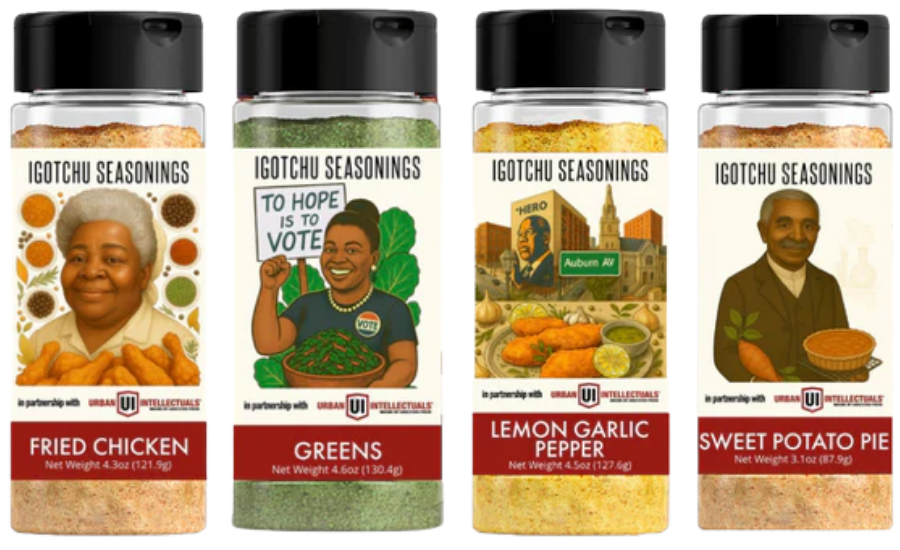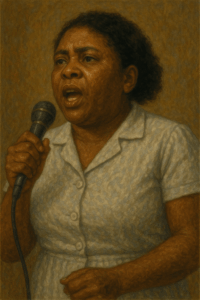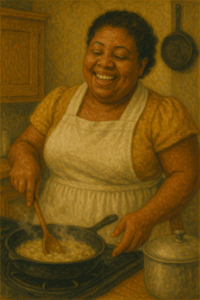
Greens of Justice: Fannie Lou Hamer’s Fight for Land, Rights, and Nourishment
Extended Readings from the Igotchu x Urban Intellectuals Seasonings Collaboration — celebrating the flavors of resilience and Southern roots.
Explore Fannie Lou Hamer | Georgia Gimore | Sweet Auburn | George Washington Carver

Igotchu Seasonings X Urban Intellectuals Collaboration, 4 Flavor Seasonings + History Pack!
Introduction
Few voices shook America’s conscience like Fannie Lou Hamer’s. A sharecropper turned activist, she fought tirelessly for voting rights, land ownership, and dignity for Black people in the South.
Hamer knew that political freedom was tied to food and land. “You can give a man the right to vote,” she said, “but if he has no land or food, what good is that?” She believed nourishment was a cornerstone of liberation.
This Greens Seasoning honors her Southern roots. Greens — collard, mustard, or turnip — have long symbolized survival and abundance in Black communities. For Hamer, they were more than food; they were proof that land and nourishment sustain both body and revolution.
The Legacy
Early Life
 Fannie Lou Townsend Hamer was born in 1917 in Montgomery County, Mississippi, the youngest of 20 children. Her parents were sharecroppers, and poverty shaped her childhood. By age six, Hamer was already working in the cotton fields. She left school at 12 to labor full time, enduring backbreaking work for meager wages.
Fannie Lou Townsend Hamer was born in 1917 in Montgomery County, Mississippi, the youngest of 20 children. Her parents were sharecroppers, and poverty shaped her childhood. By age six, Hamer was already working in the cotton fields. She left school at 12 to labor full time, enduring backbreaking work for meager wages.
Growing up in the Mississippi Delta, she learned the rhythms of land and food — how to cook greens, hoe cotton, and stretch meager supplies into meals. But she also saw how poverty and racism worked together to trap Black families in cycles of debt.
In 1944, she married Perry “Pap” Hamer, and the couple continued sharecropping. Fannie Lou managed household tasks, cared for livestock, and worked the land. Though life was difficult, she had a natural charisma, deep faith, and fierce sense of justice that would later propel her into history.
A Turning Point
Hamer’s life changed dramatically in 1962, when she attended a meeting organized by the Student Nonviolent Coordinating Committee (SNCC). For the first time, she heard that Black people had a constitutional right to vote. At 44 years old, she volunteered to register.
That act of courage cost her everything. She was fired from her job, evicted from the plantation where she lived, and subjected to threats and violence. Later, she was brutally beaten in jail after attending a voter registration workshop — injuries she carried for the rest of her life.
But instead of retreating, Hamer became more determined. She joined SNCC as a field secretary and began organizing voter registration drives across Mississippi, encouraging ordinary people to claim their rights.
A Voice That Couldn’t Be Ignored
 Hamer rose to national attention in 1964 during the Democratic National Convention in Atlantic City. As co-founder of the Mississippi Freedom Democratic Party (MFDP), she challenged the all-white Mississippi delegation, demanding recognition for Black voters who had been systematically excluded.
Hamer rose to national attention in 1964 during the Democratic National Convention in Atlantic City. As co-founder of the Mississippi Freedom Democratic Party (MFDP), she challenged the all-white Mississippi delegation, demanding recognition for Black voters who had been systematically excluded.
Her televised testimony about being jailed and beaten nearly to death for trying to vote stunned the nation:
“Is this America, the land of the free and the home of the brave, where we have to sleep with our telephones off the hooks because our lives be threatened daily, because we want to live as decent human beings?”
Her raw honesty made her one of the most compelling voices of the civil rights movement. Though the MFDP’s challenge was ultimately rejected, her testimony forced America to confront the brutality of Jim Crow.
Freedom Farm Cooperative
Hamer understood that voting rights alone were not enough. In 1969, she founded the Freedom Farm Cooperative (FFC), a bold experiment in food sovereignty. The co-op purchased hundreds of acres of land in Sunflower County, Mississippi, where families could grow vegetables, raise livestock, and build independence from white-controlled plantations.
The farm also created a “pig bank”: families could borrow a pig to breed and raise, ensuring long-term food security. Hamer’s vision was revolutionary — linking political freedom with economic self-sufficiency and nourishment.
Though the co-op faced financial challenges and eventually closed in the late 1970s, it provided food, dignity, and hope for hundreds of families. Hamer proved that land and greens were as essential to freedom as ballots and speeches.
The Food Connection
Greens in Black History
Collard greens, mustard greens, and turnip greens have long been staples of Black Southern cuisine. Brought to the Americas through African agricultural knowledge, greens became central to enslaved diets. They were often simmered with bits of pork, onion, or spices, transforming humble ingredients into hearty, sustaining meals.
The broth left behind, known as “potlikker,” was considered sacred. Nutrient-rich and flavorful, potlikker symbolized the ingenuity of enslaved cooks, who extracted every ounce of nourishment from what little they had.
After emancipation, greens remained a symbol of survival. Families grew them in gardens, cooked them for Sunday dinners, and passed down recipes through generations. Eating greens at New Year’s became a ritual symbolizing prosperity and health.
Hamer’s Connection
 For Hamer, greens were tied to land and liberation. On her Freedom Farm, greens were among the staple crops that sustained families. They represented independence from white-controlled plantations and the dignity of growing one’s own food.
For Hamer, greens were tied to land and liberation. On her Freedom Farm, greens were among the staple crops that sustained families. They represented independence from white-controlled plantations and the dignity of growing one’s own food.
Greens were also cultural glue — shared at community gatherings, political meetings, and church suppers. They nourished not only bodies but movements. To season and eat greens was to celebrate survival and community resilience.
This seasoning blend honors that tradition. It carries the flavor of fields, faith, and freedom — just as Hamer carried the voice of a people determined to be free.
Why It Matters Today
Hamer’s vision remains urgent. Food insecurity continues to disproportionately affect Black communities. In both rural Mississippi and urban centers across the U.S., access to fresh produce is limited. Supermarkets are scarce, prices are high, and processed foods dominate. The result is higher rates of diabetes, hypertension, and other diet-related illnesses.
Hamer’s Freedom Farm was ahead of its time. Today, movements for food justice, urban farming, and cooperative economics echo her vision. Community gardens, Black-owned farms, and cooperative groceries are carrying her torch. Her belief that freedom must feed the people still guides activists fighting hunger and inequality.
Her life also teaches resilience. Despite poverty, violence, and systemic racism, Hamer refused to be silent. She turned personal pain into collective power, reminding us that change is possible when ordinary people act with extraordinary courage.
Cooking greens today can be more than a meal. It can be a remembrance of Hamer’s struggle and a recommitment to her vision: communities fed by their own hands, families nourished by their own land, and freedom rooted in dignity.
Reflection & Table Talk
-
What foods in your family symbolize survival and strength?
-
How do land and food tie into freedom for your community today?
-
What lessons can we learn from Hamer about turning personal struggle into collective action?
-
How can we support local farms, gardens, and food co-ops in our own neighborhoods?
Call to Action
This seasoning is more than flavor — it’s an invitation to reclaim your story.
That’s why Igotchu Seasonings and Urban Intellectuals joined forces: to remind us that every kitchen can be a classroom, every bite a lesson in resilience.
- 🌱 Collect the full set of seasonings — each tied to a Black history legend, from Georgia Gilmore to Fannie Lou Hamer. Click here to purchase and learn more.
- 📚 Dive deeper with our Black History Flashcards — 52 powerful cards filled with stories like Carver’s, made for families to learn together. Click here to grab a deck.
- 🌍 Start your children early with the Sankofa Club — live and on-demand classes where kids discover Black history, leadership, and pride. Click here to join the club.
Your purchase keeps culture alive — on the table, in the classroom, and across generations. Because food tells our story. Let’s make sure it never goes untold.

Igotchu Seasonings X Urban Intellectuals Collaboration, 4 Flavor Seasonings + History Pack!
Sources / Further Reading
-
Lee, Chana Kai. For Freedom’s Sake: The Life of Fannie Lou Hamer. University of Illinois Press, 1999.
-
Hamer, Fannie Lou. The Speeches of Fannie Lou Hamer: To Tell It Like It Is. University Press of Mississippi, 2011.
-
Payne, Charles. I’ve Got the Light of Freedom: The Organizing Tradition and the Mississippi Freedom Struggle. University of California Press, 1995.
-
SNCC Digital Gateway. “Fannie Lou Hamer.”
-
Magarrell, Joan. “Freedom Farm Cooperative: Fannie Lou Hamer’s Vision of Self-Sufficiency.” Journal of Southern History, 2004.





